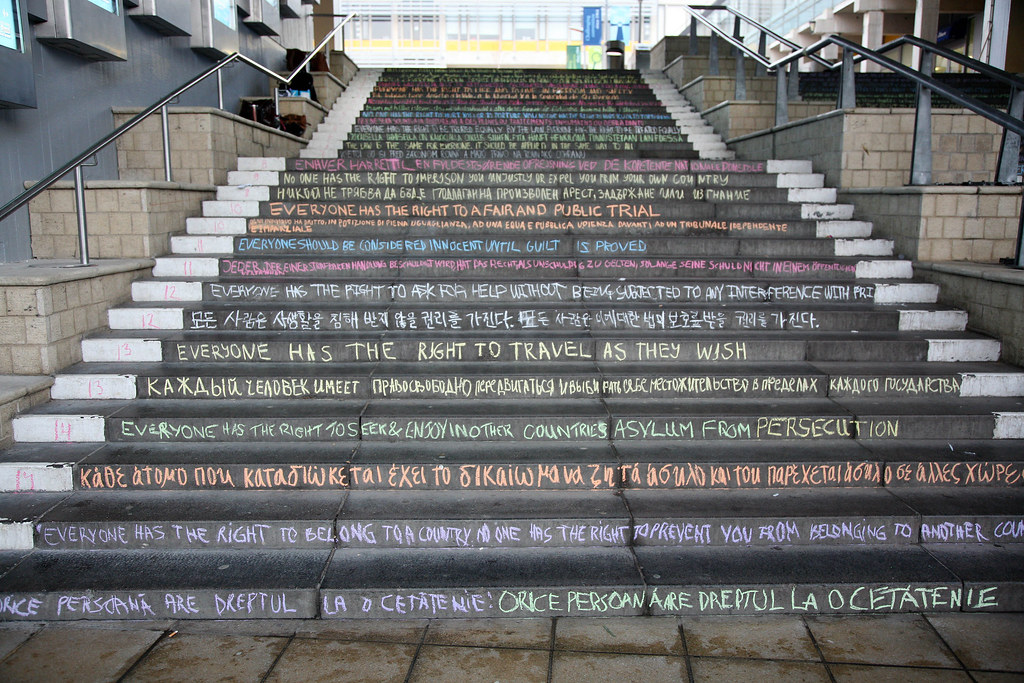By Dr Andrew Fagan
I begin this important piece by expressing my shock and horror at the catastrophic events unfolding at this present time in Israel and Gaza. Beginning with Hamas’s incredibly brutal murder of 1400 men, women, and children in Israel on October 7th; the latest disastrous chapter in the conflict between Israel and Palestine extends to an ongoing military campaign in Gaza which has cost the lives of some 5000 people in the Gaza strip to date. No one can tell just how many more lives will be lost as this campaign unfolds, nor what fate awaits the over 200 Israelis who were taken hostage by Hamas. I know my sense of shock and horror will be shared by many across the global human rights community and everyone within the Essex human rights community.
My deepest thoughts also go out to the many in the Essex University community, and Essex human rights alumni who are directly affected by the attacks upon Israel and Gaza. Included amongst our 3000 alumni are many Israeli, Jewish and Palestinian human rights defenders who have quite literally risked their lives as they have sought to defend and uphold human rights principles in their homelands. There will also be many Essex human rights alumni who are affected directly and indirectly in this conflict through their work in organisations such as the UN, the International Committees of the Red Cross and Red Crescent, Medecins Sans Frontieres, Amnesty International, Human Rights Watch, Save the Children, and many others, or through living or with family living in the region. I hope that all our alumni and their families are safe. Know that our thoughts are with you.
This awful conflict raises a great many profoundly important and difficult questions for the global human rights community. While I am sure that everyone in the Essex community shares my sense of shock and horror, some differences of opinion inevitably exist amongst us across a vast swathe of highly complex and deeply divisive issues concerning the law, morality, and politics of the conflict between Israel and Palestine. Some amongst our community have asked what the Human Rights Centre can and should do in its response to this conflict. I know that profound differences of opinion exist even on this fundamental question, ranging from those who will insist that the HRC must remain silent on this issue to those who expect and demand what they are likely to construe as the need for the HRC to display moral leadership in the face of such terrible human suffering.
I want to take this opportunity to address those concerns. Silence can all-too easily be construed as indifference, disdain, or worse. Silence is not, I believe, a viable option for us to maintain. However, in a climate beset by so much anger and pain, it is crucial that the HRC acts appropriately and constructively, based upon the core values which unite us.
While the global human rights community is united in mourning the devastating loss of life and hardship in recent weeks, there are undeniable differences in the community in its approach to the escalating death toll in Israel and Gaza presently. The issues are profoundly complex and emotive, and disagreements are inevitable. The HRC resolutely will not contribute to or seek to resolve those disputes. We will not become an adversary or protagonist in this wider conflict of words. We ask only that everyone in our community acts with compassion and empathy, especially towards those who hold different views on the Israel/Palestine conflict.
So, what have we done and what will we do?

The HRC and the University of Essex has a long and proud track-record of seeking to protect and promote the human rights of everyone affected by the decades-long conflict between Israel and Palestine.
In addition to the vital work our alumni are engaged in, the HRC has made lasting contributions to combatting antisemitism and Islamophobia through the work of our esteemed colleague, Professor Ahmed Shaheed, whose work in this area was profiled just this week by the University. In his role as the former UN Special Rapporteur for Freedom of Religion or Belief, Professor Shaheed produced two ground-breaking UN reports into combatting antisemitism and Islamophobia. Since 2020, I have served as Co-Chair of the University’s Holocaust Memorial Week organising committee. The University’s week-long programme of events to mark the Holocaust and other subsequent genocides underlines our commitment to combatting antisemitism and was recently highlighted as an example for other universities to follow in a UK Parliament report.
The HRC also has a long track-record in combatting intolerance across the globe. We return to this theme in our upcoming HRC Speakers Series annual event to mark Tolerance Day in mid-November, which will include a focus upon Islamophobia.
Many of our HRC Members have been engaged for many years in teaching, researching, and advocating for respecting the laws of armed conflict, and the rights of displaced persons and refugees. Recently, the HRC’s Armed Conflict and Crisis Hub secured £1.5 million to fund research into reducing civilian casualties in war. Indeed, on this very day, the Armed Conflict and Crisis Hub is also co-organising a high-level one day-conference, which brings together academic experts and practitioners to engage with current legal issues in the law of armed conflict.
Undoubtedly, the ongoing conflict in Israel and Gaza will be considered at each of these events and initiatives.
Beyond these efforts, the HRC will also draw upon our globally recognised strengths in education and research as we seek to constructively engage with the acute human rights and humanitarian issues the conflict entails. We will ensure that our students benefit from our expertise as they seek to cut through waves of disinformation in their attempts to understand and respond to the conflict. We also have plans to engage the wider HRC community and public through a podcast recording which will bring together expert analysis of the conflict. We also recognise that some governments’ (including that of the UK) response to peaceful protests raise important human rights concerns, which we plan to address through a subsequent HRC event.
Silence is not an option. The HRC has and will continue to engage in one of the world’s most complex and protracted conflicts. However, to reiterate, our response has not been and will not be partisan, nor will we seek to take sides. Our engagement is fundamentally shaped by respect for the equal human rights of all people. As dark as these current times undoubtedly are, we must continue to strive to get through them together, united in our respect for human rights.
*

